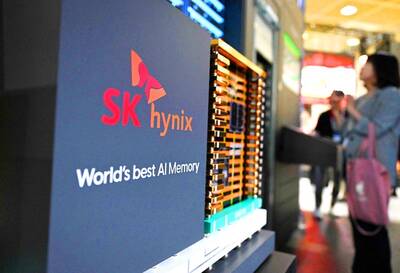United Microelectronics Corp (UMC, 聯電), the world's second largest contract chipmaker, yesterday said its quarterly earnings dipped almost 80 percent from a year earlier on lower prices as demand dwindled amid customers' constant digestion of inventory.
"Now we're seeing a healthy inventory reduction ... We believe this is a positive sign showing that the industry is approaching the bottom of the curve," chief executive officer Jackson Hu (
A turnaround is expected to arrive in the third quarter as demand rebounds, boosting chip prices and increasing UMC's shipments, Hu said.
Feedback from customers indicated that demand for chips used in mobile phones would increase significantly in the second half of this year, he added.
UMC, which supplies chips to Xilinx Inc, received a bulky 45 percent of its total revenues from the communication segment last quarter.
As demand is expected to remain weak in the April-June period, further driving down the company's factory utilization rate to 60 percent, Hu said UMC's profitability could weaken further to breakeven point in terms of gross profit.
Last quarter, UMC's earnings dropped for the third straight quarter to NT$1.52 billion, down 78 percent from NT$6.9 billion a year ago, the company said. Earnings per share also dipped to NT$0.09 from NT$0.41 year-on-year. Revenues fell 20 percent to NT$20.29 billion at an annual pace.
The chipmaker blamed a 12-percent slide in chip prices for the profit decline. The downtrend could carry on into this quarter, Hu said.
Low chip prices caused operating income to fall more drastically by 94 percent to NT$302 million, compared with NT$5.29 billion a year earlier, according to UMC.
Non-operating income reached NT$1.22 billion, derived mostly from the proceeds of UMC's sale of shares in its affiliates, including MediaTek Inc (聯發科技) and Novatek Microelectronics Corp (聯詠科技).
"To boost its bottom line, UMC will continue the share sale [on the public market] as there are no clear signs indicating a strong growth momentum for the chipmaker," said Paul Tsai (蔡昀達), a portfolio manager who oversees a NT$500 million fund for International Investment Trust Co Ltd (國際投信).
Demand seemed to be stabilizing, but a strong improvement seemed unlikely, Tsai said. He said UMC's first-quarter result was slightly better than expected.
From investors' point of view, however, UMC looked attractive, compared with companies such as its bigger rival, Taiwan Semiconductor Manufacturing Co (TSMC, 台積電). Daniel Heyler, a semiconductor analyst with Merrill Lynch, assigned a "buy" rating to UMC, saying "both the valuation and utilization of UMC are in the trough."
Heyler gave a "neutral" rating on TSMC.
Overseas fund managers have bought 40.71 million UMC shares during the past three trading sessions, pushing UMC 0.27 percent higher to close at NT$18.45 on the Taiwan Stock Exchange.
Hu yesterday shunned investors' questions about the government's ongoing probes into UMC's allegedly illegal ties with Chinese chipmaker He Jian Technology (Suzhou) Co (
Last week, the Financial Supervisory Commission fined UMC chairman Robert Tsao (

Intel Corp chief executive officer Lip-Bu Tan (陳立武) is expected to meet with Taiwanese suppliers next month in conjunction with the opening of the Computex Taipei trade show, supply chain sources said on Monday. The visit, the first for Tan to Taiwan since assuming his new post last month, would be aimed at enhancing Intel’s ties with suppliers in Taiwan as he attempts to help turn around the struggling US chipmaker, the sources said. Tan is to hold a banquet to celebrate Intel’s 40-year presence in Taiwan before Computex opens on May 20 and invite dozens of Taiwanese suppliers to exchange views

Application-specific integrated circuit designer Faraday Technology Corp (智原) yesterday said that although revenue this quarter would decline 30 percent from last quarter, it retained its full-year forecast of revenue growth of 100 percent. The company attributed the quarterly drop to a slowdown in customers’ production of chips using Faraday’s advanced packaging technology. The company is still confident about its revenue growth this year, given its strong “design-win” — or the projects it won to help customers design their chips, Faraday president Steve Wang (王國雍) told an online earnings conference. “The design-win this year is better than we expected. We believe we will win

Power supply and electronic components maker Delta Electronics Inc (台達電) yesterday said it plans to ship its new 1 megawatt charging systems for electric trucks and buses in the first half of next year at the earliest. The new charging piles, which deliver up to 1 megawatt of charging power, are designed for heavy-duty electric vehicles, and support a maximum current of 1,500 amperes and output of 1,250 volts, Delta said in a news release. “If everything goes smoothly, we could begin shipping those new charging systems as early as in the first half of next year,” a company official said. The new

SK Hynix Inc warned of increased volatility in the second half of this year despite resilient demand for artificial intelligence (AI) memory chips from big tech providers, reflecting the uncertainty surrounding US tariffs. The company reported a better-than-projected 158 percent jump in March-quarter operating income, propelled in part by stockpiling ahead of US President Donald Trump’s tariffs. SK Hynix stuck with a forecast for a doubling in demand for the high-bandwidth memory (HBM) essential to Nvidia Corp’s AI accelerators, which in turn drive giant data centers built by the likes of Microsoft Corp and Amazon.com Inc. That SK Hynix is maintaining its